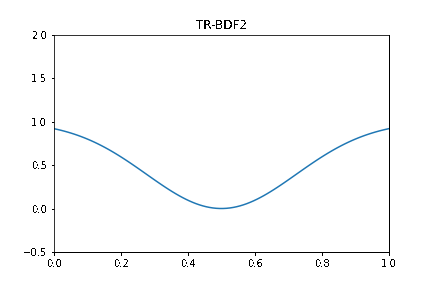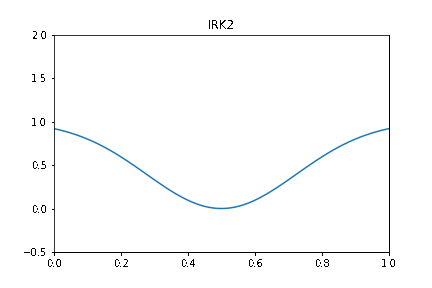Consider the problem $$ \begin{cases} u_t - \Delta u = 0 &\text{ on } \Omega\times (0,T)\\u=0 &\text{ on } \partial \Omega\times (0,T) \\ u(x,0)=g(x) &\text{ on } \Omega \end{cases} $$ Here, $g$ is not zero on $\partial \Omega$ and $\Omega$ is smooth but not convex. Do you know of any FEM based fully discrete approach that is able to nicely handle the initial time singularity? On which assumptions on $g$, that do not imply setting it to $0$ on $\partial \Omega$?
-
$\begingroup$ Have you tried something and gotten bad results? I think the main thing you will need to worry about is using a time integrator that is L-stable. And, at least intuitively, DG methods might work better than conventional FEM. You are likely to get better answers on scicomp.SE. $\endgroup$– David KetchesonCommented May 7, 2022 at 18:39
1 Answer
I know you asked about FE methods, but even simple finite difference methods can deal with this singularity reasonably well. Here is a solution of a 1D problem computed with a 3-point centered difference in space and a 2nd-order A-stable, L-stable method in time:
The main thing you need to worry about is using an L-stable time integrator (or very small time steps). Here is what happens with a method that isn't L-stable:
Notice the oscillations near the boundaries. This numerical solution still converges to the correct one, but the convergence is very slow for small $t$.
-
$\begingroup$ Many thanks for the hint and the animations. I am mainly concerned about a priori error estimates: do you happen to have a reference that discusses theoretical guarantees of L-stable time integrators when it comes to problems exhibiting such a discontinuity? Answering to what I have tried in this direction, I checked, among other sources, the reference book on the topic (link.springer.com/book/10.1007/3-540-33122-0) without finding anything. $\endgroup$– LillaCommented May 7, 2022 at 19:51


